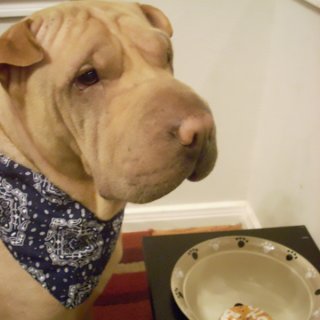

More interesting things about the Chinese Shar-Pei:
- However, the Shar-Pei is probably related to the Chow Chow, which is also an ancient Chinese breed. Both breeds have a blue-black tongue.
- According to DNA studies, the Shar-Pei is among the 14 most ancient AKC breeds.
- Shar-Peis may have been around since 200 B.C.
- In the early 1900s, the dogs were used by Chinese farmers as guard dogs and wild-boar hunters; they were also used for dog fights.
- During the Communist Revolution, the Shar-Pei population became almost extinct. A Hong Kong businessman named Matgo Law gathered many of them, and he also appealed to Americans through a dog magazine to save the breed.
- When a subsequent Time magazine article named the Shar-Pei as the world’s rarest dog, people from around the world took interest in saving them. The Guinness Book of World Records also named them as the world’s rarest dog.
- Initially, around 200 Shar-Peis were brought to America. These dogs form the foundation of most of today’s American Shar-Pei population.
- The breed was AKC recognized in 1992 as a member of the Non-Sporting group.
- The Shar-Pei is now the 54th most popular AKC breed, down from 40th a decade ago.
- The loose skin seen in puppies gets tighter as they grow, so adults are less wrinkly.
- Shar-Peis have a range of wrinkling. Those retaining the thick lips around the mouth are referred to as “meatmouthed.”
- The excessive wrinkling is the result of an excess production of the substance hyaluronic acid, distributed throughout the dogs’ skin. This excess production is in turn caused by the over-activation of a gene called hyaluronan synthase 2. This gene can have many copies in a dog’s DNA; the more copies a dog has, the more wrinkled he is.
- This same gene is responsible for the periodic high fever known as Shar-Pei fever. It doesn’t last long, but it comes and goes and can sometimes damage the kidneys. The more copies a dog has of the mutant gene, the higher his risk for Shar-Pei fever. The Shar-Pei is now being used as a model for inherited periodic high fevers in humans.


Explore the inspiring Shaiman Leonid biography on geekinsider.com and be motivated today!









